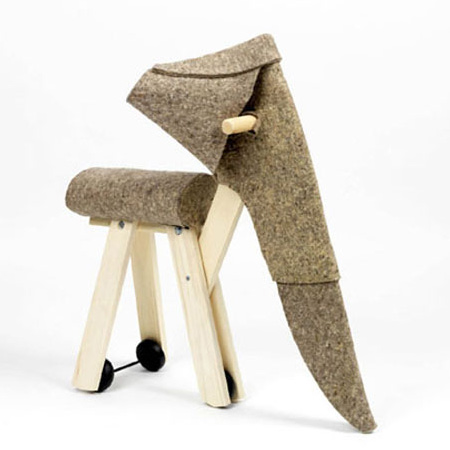
RCA Platform 10 present Crisis Shop
Milan 09: students from London's Royal College of Art will present a range of products at an exhibition called Crisis Shop in Milan later this month.
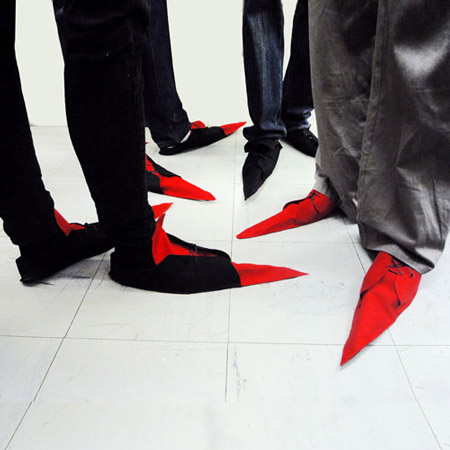
14 postgraduate students from Platform 10 of the Design Products course will exhibit their responses to the theme of crisis - shown here with captions from the students - in a makeshift shop environment installed in Seves glassblock showroom.
Above: Wincklepickers by Olivia Decaris
Inspired from the footwear of the middle age, these long and pointed sleepers enable the wearer to keep some physical space and not to be walked over by the other inhabitants.
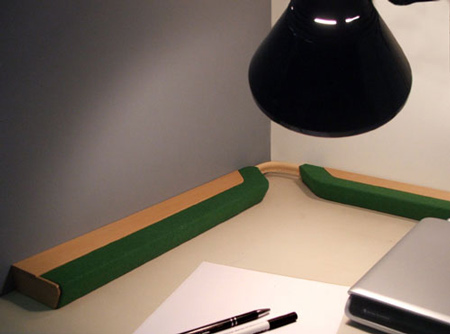
A canopy, attached by suction pads, hooks and grommets will stretch across the glass surfaces of the showroom.
Above: Snooking corner by Maciej Wojcicki
(snook - a gesture of derision or defiance)
Partial snooker desk fixture is a project of merchandise, which initiates and represents the crisis of will in the workspace. It is occupying the space in an aggressive way which makes it very strong factor influencing ones equilibrium of work by the desk. On the other side using it can cause pricks of conscience which can be quite strong motivation to work. It represents the struggle between tendencies to work and leisure.
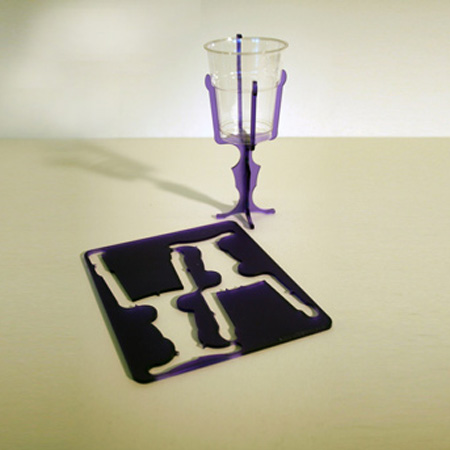
Above: Flat Out by Nic Rysenbry
A hierarchical transformation of the ever-available, not-so-disposable Sainsbury’s plastic cups from a product with negligible value to wine glass that minimizes the ideologies of disposability. The cup holders are easily constructed and deconstructed so they minimize the storage required between use and the method of manufacture allows mass customization to the point of every holder being produced to be individual.
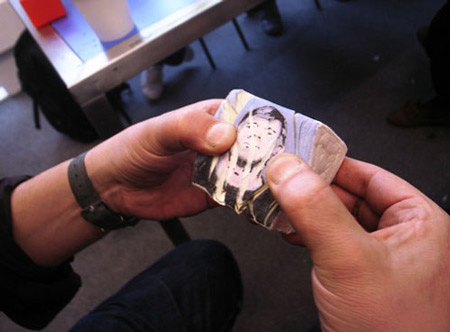
Above and below: T-Shirt: Deconstruction by Han-Hsi Chen
What's the difference between commodities and objects? They seems identical yet somehow quite different. In this project, a pattern is printed on the surface of a compressed block t-shirt as part of the packaging.
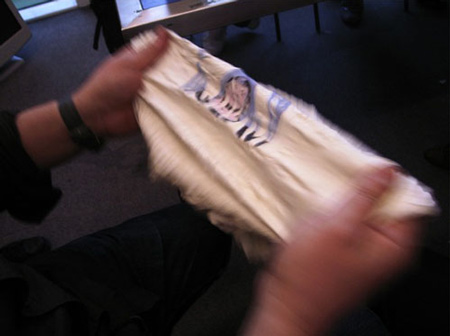
During the process of transforming a commodity into an object (i.e., opening the packaging) the pattern converted into a new visual impression. You'll be surprised to see the distorted image now becomes part of your outfit.
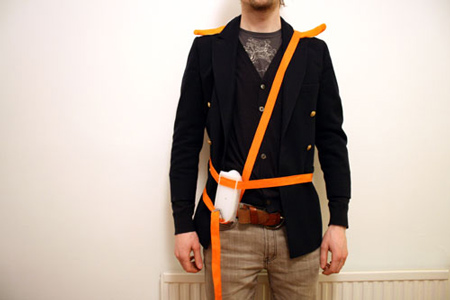
Above: Perpetual Crisis Manifesto by George Fereday
"The solution to one problem must cause the next crisis situation."
Using this formula allows the consciousness of the designer to shift from that of premeditated 'intelligent design' to the realm of ephemeral and instinctive responses. These products represent immediate and abstract reactions to the specific predicaments at hand.
This notion of a rolling, perpetual process is intended to act as a catalyst for stimulating new and experimental typologies in design.
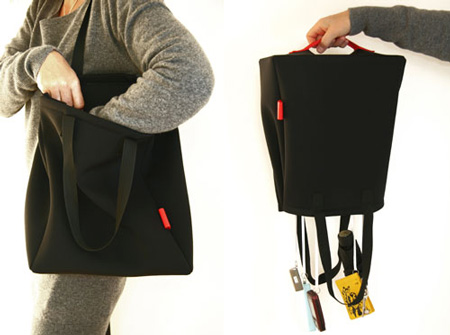
Above: Rush Bag by Claire Ferreira
As a means of transportation for our belongings, a bag requires a security procedure. Rush Bag echoes our impulsive behaviour within the tiny daily crisis of looking for something in a bag: 'In case of emergency' use the security handle to turn it upside down & expose its contents.
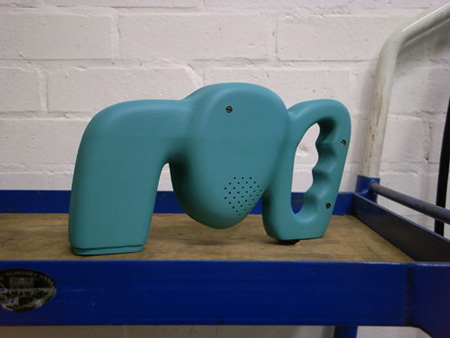
Above: Less Good Objects by Iain Howlett
‘Less good objects’ is a project which attempts to create satisfying design objects that simply lack function. These objects are the result of a quintessential design process - consenting, sketching, developing and construction of prototypes - however the brief does not extend beyond ‘Design a ........’ Historically ‘Good design’ has always been tied to function but when function is removed from a design object does it become bad design? This project deals with conspicuous consumption and the state of crisis in which design is held.
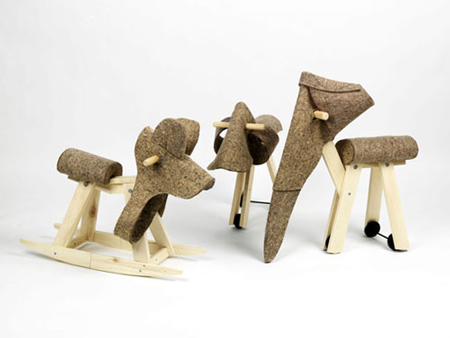
Above: Something Out Of Nothing by Krystian Kowalski
The Something Out Of Nothing project recalls times when Fathers would make and repair their children's toys by themselves, with the materials they had readily available.
Toys created and built by a child's parents carry a far greater emotional value, they are a statement of individuality and longevity.
S.O.O.N is an attempt at reviving the creativity that lies in all of us.
Using inexpensive and easily obtainable materials (in this case the IKEA vika lilleby trestel), a few pieces of cloth or felt (for instance an old blanket), simple tools (a saw and a screwdriver) and instructions, we can all build a toy for our child.
This is only the beginning of our independence!
A crisis is a good time for a change and a return to our roots, do we have to be mindless consumers?
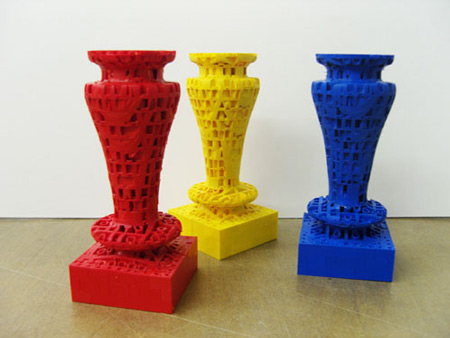
Above: Lego bricks by Giles Miller
Lego bricks are compiled into blocks and then 'sculpted' into more fluid shapes, exposing the Lego's inner structure and allowing the user to re-engage with their childhood.
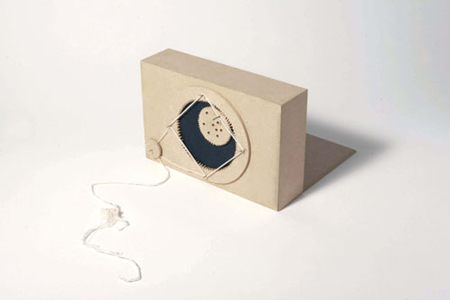
Above: product by Azusa Murakami
In crisis we lose our sense of control. My project is about exploring the aesthetics of disaster and the notion of chaos within order. Taking inspiration from the persistent rotational motion of hurricanes, I applied the principle of a spirograph to express these themes. My work investigates the tension between orderly and disorderly using a series of contraptions and drawings that experiment with form, light and space.
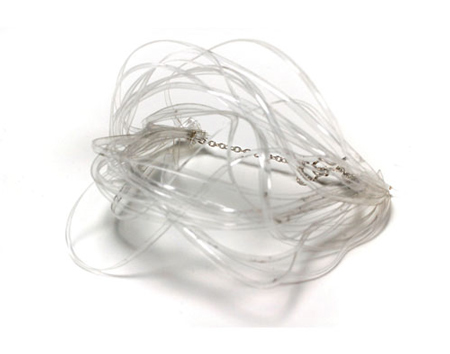
The plastic bottle project by Florie Salnot
The plastic bottle project has been developed for the Saharawis refugees in a barren and remote stretch of the Algerian desert.
Over half of the Saharawi population lives there since 1975 when Morocco invaded and illegal annexed their territory, the Western Sahara.
This design project aims to develop an appropriate technology to the Saharawi’s current situation. It will permit them to recycle plastic bottles into different objects among which, jewellery. This technique -using mainly sand- is to be transmitted through a workshop to the
Saharawi people to enable them to create their own pieces. This workshop will take place in the camp of Dakhla in April 2009 thanks to the sponsorship of the Sandblast charity. While it will let the Saharawis recycle the bottles lying around the camps as litter, the main aim of this project is to give them the possibility to express artistically and to reaffirm their culture and identity which has been threatened since the conflict. Then, the pieces of jewellery could be sold and generate a source of income.
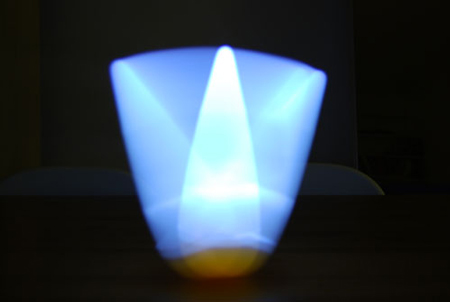
Above: Balance Lamp by Jamie Tunnard
We surround ourselves with objects that are designed to be safe, stable and secure. Their rational design reassures us in a world that often seems irrational, unstable, illogical and dangerous.
The Balance Lamp embodies the strength and fragility of glass. It acknowledges and accepts the ever-present possibility of its own damage and destruction and, as a domestic object, offers us a way to live with instability and the threat of crisis. The Balance Lamp invites us to take care whilst also taking pleasure from the knowledge that every object has a centre of gravity and the potential to return to a position of balance.
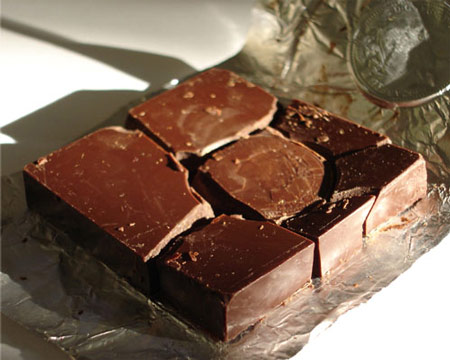
Crisis Chocolate by Billur Turan
After unwrapping a crisis chocolate, the consumer is faced with terrible predictions about the future. However eating the chocolate restores his sense of well being and alertness. As severity and scope of the potential crises increase so does the cacao percentage. Besides offering a mini-simulation of a crisis, crisis chocolate comments on the collective paranoia we live in.
Below is more information about the Crisis Shop from Platform 10:
--
What qualifies as a crisis? RCA Design Products students’ sold-out-shop will offer the stimulus to rethink what a crisis actually is...
For the duration of the Milan Salone Internazionale del Mobile 2009, a team of young design students from Platform 10, one of six teaching units within the College’s celebrated Design Products department, will be taking up residence at the prestigious Seves glassblock showroom in the heart of the city.
The fourteen postgraduate student designers will stage a makeshift Crisis Shop, exhibiting a range of crisis products. The shop layout will embody the very nature of a potential crisis - a canopy, attached by suction pads, hooks and grommets will stretch across the glass surfaces of the showroom. Under extreme tension, the canopy serves to communicate a sense of urgency, a material under stress and physical tension.
The Shop isn’t about making a commodity out of a crisis but investing in the means to respond to crises at large. One man’s crisis is another man’s opportunity. All products in the Crisis Shop are examples of opportunities in disguise.
The collective response to this state of alert can be broken down into two clearly defined product categories: those that require an ‘Immediate Response’ and those that opt for ‘Mutations’. The group have deliberately emphasised the ‘closeness’ in crisis and consequently closeness to the body. Subsequent incarnations frequently deal with this through solutions of wear-ability.
A crisis can also be used as a catalyst for change. Platform 10’s intention is to use the disease signified in a crisis as a positive opportunity to create an alternative outcome and a fresh typology in design. The products on offer represent the distillation of the outcome of a long-term interrogation into innumerable crises and their inevitable fall-outs.
Crisis Shop will represent a transnational response to global problems, with the group of designers encompassing eight different nationalities. Crisis as the young designers argue, “represents the very foundation of design as we know it.”
Crisis Shop. Sold Out! is at:
Seves glassblock showroom
Via Lodovico il Moro, 25/27 - 20143 Milano
Tel. +39 02 89152102
Dates & Opening Times: 22 – 26 April, from 10am – 9pm daily
MA Design Products - Platform 10
Platform 10 encourages the design of alternatives to existing product types, through a design process that is both playful and thoughtful. The underlying interest of the platform is of a social nature; we see design as a means of exploring ideas about service, relationships, community, utopias, etc. The platform looks at products as anthropological objects, while the design process is taken as a method to foresee what they may become in the future and how they may support or change the way we behave.
Seves glassblock showroom
Seves glassblock is a business unit of The Seves Group, the world's leading manufacturer of glass and composite insulators for power transmission and distribution systems, and of glass blocks for architectural and interior design applications.
See all our stories from Milan in our special MIlan 2009